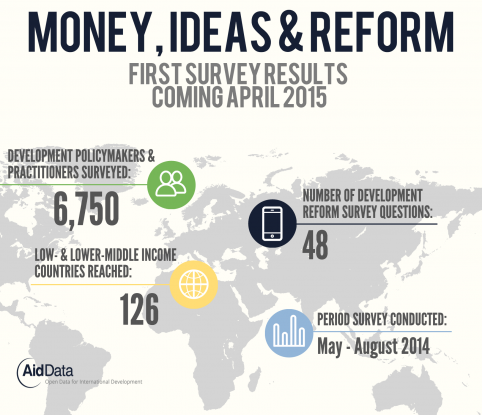International development is about influencing change. Government officials mobilize political will and seek to create an enabling environment for reforms and reform champions. Donors provide money and ideas to encourage changes in development policy and practice. Civil society activists agitate for better policies and public services. When the stars align and these actors come together with the right combination of resources, ideas and political commitment, countries can achieve major improvements in social, political and environmental outcomes. But what does it take to disrupt the status quo and catalyze lasting reforms?
Understanding the interplay between money, ideas, reform and development outcomes is difficult and usually limited to guesswork, or trial and error. But what if we could learn from development policymakers and practitioners on the frontlines? Today, AidData announces the launch of a survey practice that seeks to do just that.

Illuminating a black box: Understanding the drivers & impacts of reform
While working at the Millennium Challenge Corporation (MCC), Brad Parks met with senior government officials from low-income and lower-middle income countries to review their performance on the MCC’s scorecards and discuss their potential eligibility for hundreds of millions of dollars in MCC assistance. Some government ministers were enthusiastic about reform and eager to learn how the US government assessed their country’s policy performance. Others were allergic to engaging in a policy dialogue with Washington. These widely divergent responses begged for explanation.
An initial flash of inspiration produced two proof of concept exercises at the College of William & Mary to collect experiential and perception-based information from the actual makers and shapers of policy in developing countries. Brad and Zach Rice fielded the 2012 Millennium Challenge Account (MCA) Stakeholder Survey to understand whether, when and how the MCC’s performance-based model of aid allocation had influenced reforms in aspiring MCC partner countries.
Brad and Zach also designed and implemented the 2014 Reform Efforts Survey to better understand the wider constellation of external and domestic factors that influence reform efforts and outcomes in the developing world. This first-of-its-kind survey, implemented between May and August of 2014, sought to understand the influence of resources and ideas at critical points along the policy-making process – from setting the agenda, to implementing new policies and programs and evaluating results.
The 2014 survey has produced a treasure trove of insights into how reforms are inspired, designed and implemented. The 48-question survey captures the experiences of nearly 6,750 development policymakers and practitioners in 126 low- and lower-middle income countries.
After seeing the quality and quantity of responses generated by this survey, we were convinced that the best way to scale this work was to bring it in-house and integrate it into the day-to-day work of our AidData policy team. Since January, we have been carefully analyzing this first wave of the survey data. We plan to share the results via a series of policy reports and blog posts that will be released throughout 2015.
Follow the money, track the uptake of ideas & get a pulse on local experiences
Launching a new survey practice is a natural extension of AidData’s mission to make development finance more transparent, accountable and effective. It is a response to a critical knowledge gap: the absence of reliable and comprehensive information about the role of development partners, as experienced by decision-makers and stakeholders in developing countries. This work will be guided by several key assumptions:
- Resources for development are scarce and the need for progress is great; therefore, we must seek to maximize the impact of each dollar invested.
- More and better quality data on investments and results is needed to effectively allocate resources for development and evaluate what works.
- Donors, partner governments, civil society actors and citizens bring diverse perspectives to bear on the inputs, outputs and outcomes of development. We ought to do a better job of listening to, and synthesizing input from, these different groups.
With this new survey practice, AidData hopes to improve the ability of development partners to evaluate their influence and impact, but also to encourage greater attentiveness and responsiveness to the experiences and priorities of in-country decision-makers and stakeholders. We hope to launch another omnibus survey in the summer of 2016 and design a series of shorter, more timely snap polls to take the pulse of stakeholders in partner countries on key topics such as the use and usability of open financial data, the sustainable development goals, etc.
As we lay a foundation for this line of work in the coming years, we welcome your input. In the meantime, stay tuned for the launch of our first policy report, “The Marketplace of Policy Ideas”, which will analyze a portion of the 2014 Reform Efforts Survey data. It is slated for release in April 2015.


